Task 4: Reflective Essay on Healthcare Strengths and Weaknesses
VerifiedAdded on 2021/06/16
|7
|1602
|27
Essay
AI Summary
This reflective essay analyzes the author's strengths and weaknesses as a healthcare service provider, primarily focusing on their experiences within a healthcare home. The author identifies strengths such as demonstrating dignity and respect, strong clinical expertise, and punctuality, which positively impact their professional life. A key weakness is a lack of verbal and non-verbal communication skills, which hinders interactions with clients and colleagues. The essay discusses the importance of effective teamwork and addresses barriers like poor communication and the absence of clear team goals. The author applies Belbin's theory of team roles, identifying their role as a shaper, and utilizes Tuckman's model to analyze team development stages. The author concludes that recognizing one's strengths and weaknesses and fostering effective teamwork are crucial for improving performance and achieving better outcomes in healthcare service delivery. The essay references various research papers to support the analysis and findings.
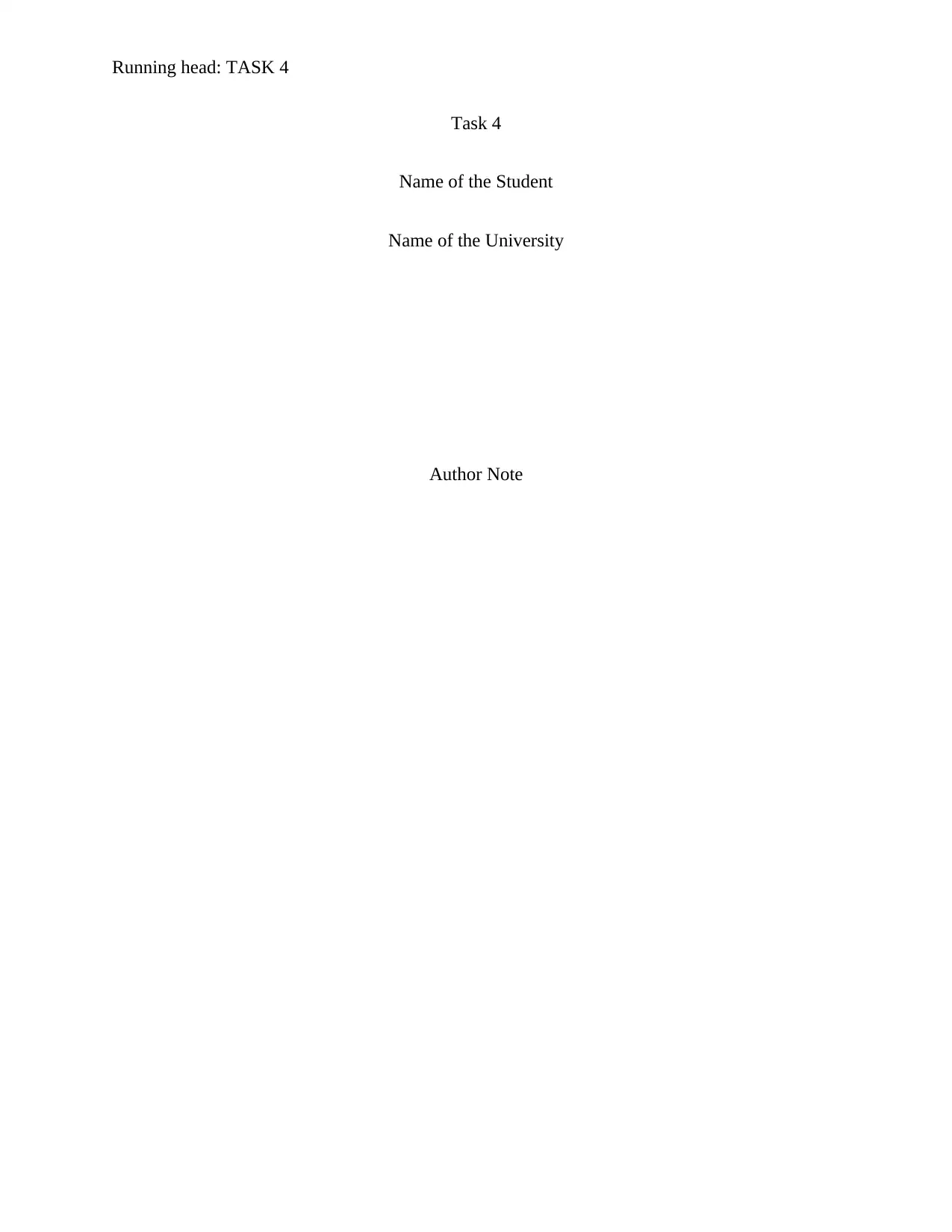
Running head: TASK 4
Task 4
Name of the Student
Name of the University
Author Note
Task 4
Name of the Student
Name of the University
Author Note
Paraphrase This Document
Need a fresh take? Get an instant paraphrase of this document with our AI Paraphraser
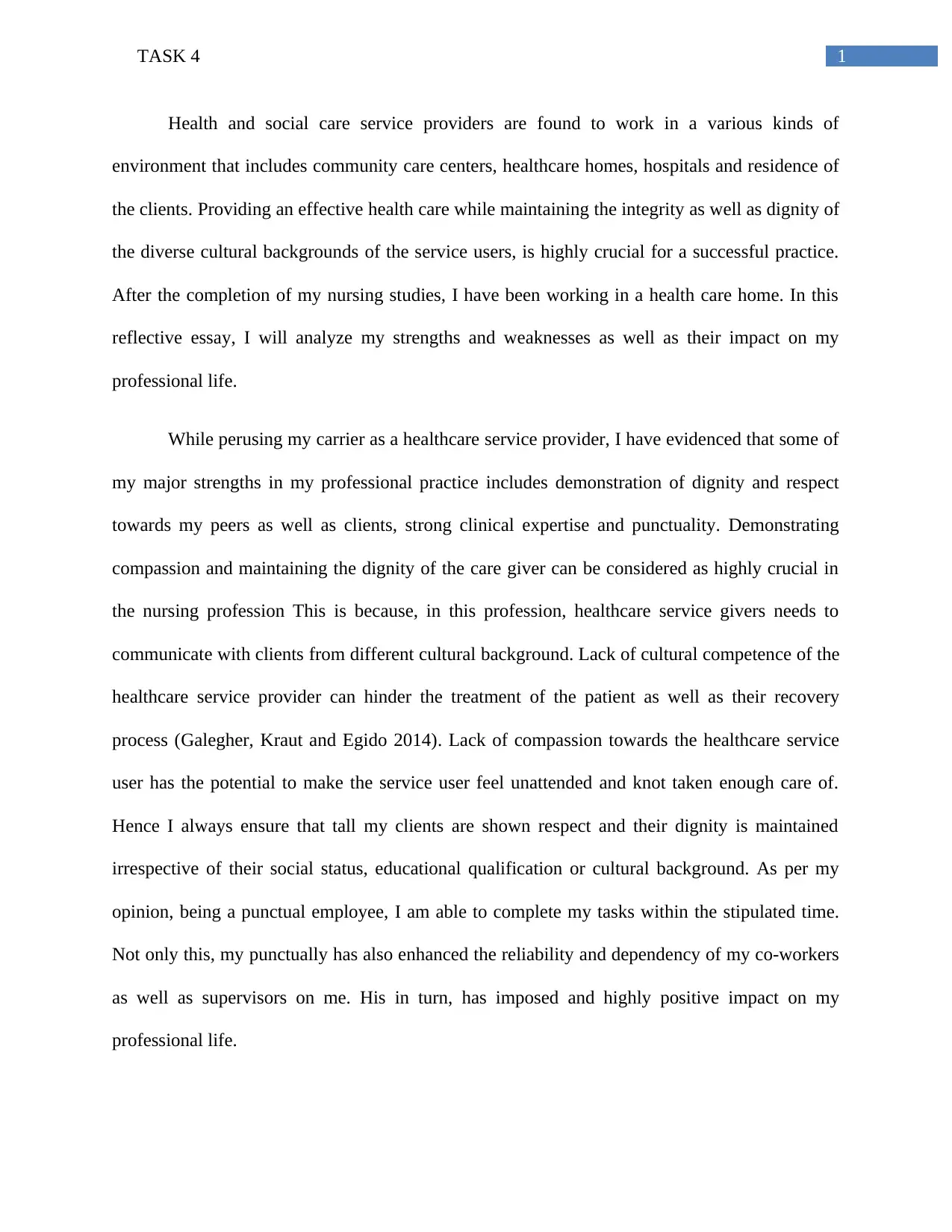
1TASK 4
Health and social care service providers are found to work in a various kinds of
environment that includes community care centers, healthcare homes, hospitals and residence of
the clients. Providing an effective health care while maintaining the integrity as well as dignity of
the diverse cultural backgrounds of the service users, is highly crucial for a successful practice.
After the completion of my nursing studies, I have been working in a health care home. In this
reflective essay, I will analyze my strengths and weaknesses as well as their impact on my
professional life.
While perusing my carrier as a healthcare service provider, I have evidenced that some of
my major strengths in my professional practice includes demonstration of dignity and respect
towards my peers as well as clients, strong clinical expertise and punctuality. Demonstrating
compassion and maintaining the dignity of the care giver can be considered as highly crucial in
the nursing profession This is because, in this profession, healthcare service givers needs to
communicate with clients from different cultural background. Lack of cultural competence of the
healthcare service provider can hinder the treatment of the patient as well as their recovery
process (Galegher, Kraut and Egido 2014). Lack of compassion towards the healthcare service
user has the potential to make the service user feel unattended and knot taken enough care of.
Hence I always ensure that tall my clients are shown respect and their dignity is maintained
irrespective of their social status, educational qualification or cultural background. As per my
opinion, being a punctual employee, I am able to complete my tasks within the stipulated time.
Not only this, my punctually has also enhanced the reliability and dependency of my co-workers
as well as supervisors on me. His in turn, has imposed and highly positive impact on my
professional life.
Health and social care service providers are found to work in a various kinds of
environment that includes community care centers, healthcare homes, hospitals and residence of
the clients. Providing an effective health care while maintaining the integrity as well as dignity of
the diverse cultural backgrounds of the service users, is highly crucial for a successful practice.
After the completion of my nursing studies, I have been working in a health care home. In this
reflective essay, I will analyze my strengths and weaknesses as well as their impact on my
professional life.
While perusing my carrier as a healthcare service provider, I have evidenced that some of
my major strengths in my professional practice includes demonstration of dignity and respect
towards my peers as well as clients, strong clinical expertise and punctuality. Demonstrating
compassion and maintaining the dignity of the care giver can be considered as highly crucial in
the nursing profession This is because, in this profession, healthcare service givers needs to
communicate with clients from different cultural background. Lack of cultural competence of the
healthcare service provider can hinder the treatment of the patient as well as their recovery
process (Galegher, Kraut and Egido 2014). Lack of compassion towards the healthcare service
user has the potential to make the service user feel unattended and knot taken enough care of.
Hence I always ensure that tall my clients are shown respect and their dignity is maintained
irrespective of their social status, educational qualification or cultural background. As per my
opinion, being a punctual employee, I am able to complete my tasks within the stipulated time.
Not only this, my punctually has also enhanced the reliability and dependency of my co-workers
as well as supervisors on me. His in turn, has imposed and highly positive impact on my
professional life.
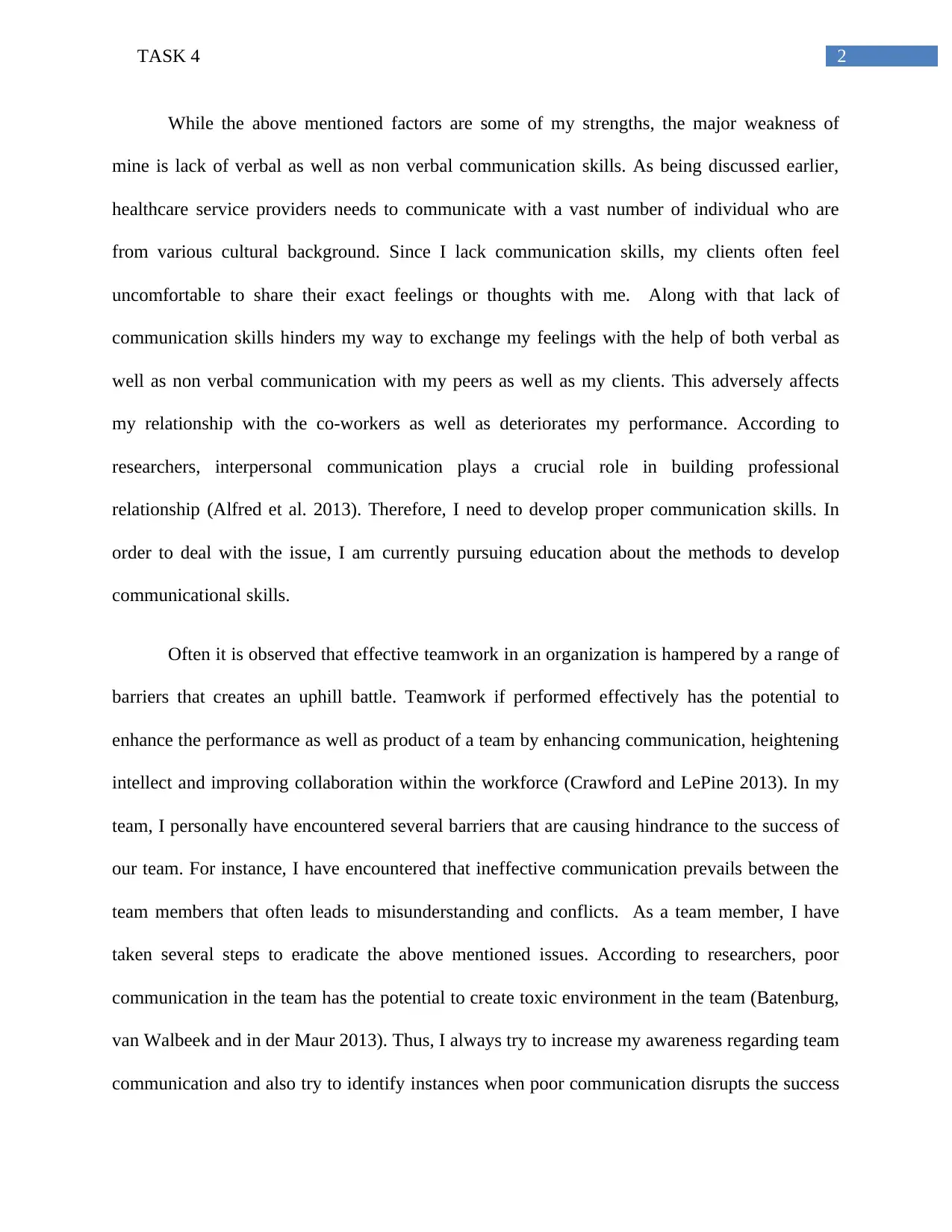
2TASK 4
While the above mentioned factors are some of my strengths, the major weakness of
mine is lack of verbal as well as non verbal communication skills. As being discussed earlier,
healthcare service providers needs to communicate with a vast number of individual who are
from various cultural background. Since I lack communication skills, my clients often feel
uncomfortable to share their exact feelings or thoughts with me. Along with that lack of
communication skills hinders my way to exchange my feelings with the help of both verbal as
well as non verbal communication with my peers as well as my clients. This adversely affects
my relationship with the co-workers as well as deteriorates my performance. According to
researchers, interpersonal communication plays a crucial role in building professional
relationship (Alfred et al. 2013). Therefore, I need to develop proper communication skills. In
order to deal with the issue, I am currently pursuing education about the methods to develop
communicational skills.
Often it is observed that effective teamwork in an organization is hampered by a range of
barriers that creates an uphill battle. Teamwork if performed effectively has the potential to
enhance the performance as well as product of a team by enhancing communication, heightening
intellect and improving collaboration within the workforce (Crawford and LePine 2013). In my
team, I personally have encountered several barriers that are causing hindrance to the success of
our team. For instance, I have encountered that ineffective communication prevails between the
team members that often leads to misunderstanding and conflicts. As a team member, I have
taken several steps to eradicate the above mentioned issues. According to researchers, poor
communication in the team has the potential to create toxic environment in the team (Batenburg,
van Walbeek and in der Maur 2013). Thus, I always try to increase my awareness regarding team
communication and also try to identify instances when poor communication disrupts the success
While the above mentioned factors are some of my strengths, the major weakness of
mine is lack of verbal as well as non verbal communication skills. As being discussed earlier,
healthcare service providers needs to communicate with a vast number of individual who are
from various cultural background. Since I lack communication skills, my clients often feel
uncomfortable to share their exact feelings or thoughts with me. Along with that lack of
communication skills hinders my way to exchange my feelings with the help of both verbal as
well as non verbal communication with my peers as well as my clients. This adversely affects
my relationship with the co-workers as well as deteriorates my performance. According to
researchers, interpersonal communication plays a crucial role in building professional
relationship (Alfred et al. 2013). Therefore, I need to develop proper communication skills. In
order to deal with the issue, I am currently pursuing education about the methods to develop
communicational skills.
Often it is observed that effective teamwork in an organization is hampered by a range of
barriers that creates an uphill battle. Teamwork if performed effectively has the potential to
enhance the performance as well as product of a team by enhancing communication, heightening
intellect and improving collaboration within the workforce (Crawford and LePine 2013). In my
team, I personally have encountered several barriers that are causing hindrance to the success of
our team. For instance, I have encountered that ineffective communication prevails between the
team members that often leads to misunderstanding and conflicts. As a team member, I have
taken several steps to eradicate the above mentioned issues. According to researchers, poor
communication in the team has the potential to create toxic environment in the team (Batenburg,
van Walbeek and in der Maur 2013). Thus, I always try to increase my awareness regarding team
communication and also try to identify instances when poor communication disrupts the success
⊘ This is a preview!⊘
Do you want full access?
Subscribe today to unlock all pages.

Trusted by 1+ million students worldwide
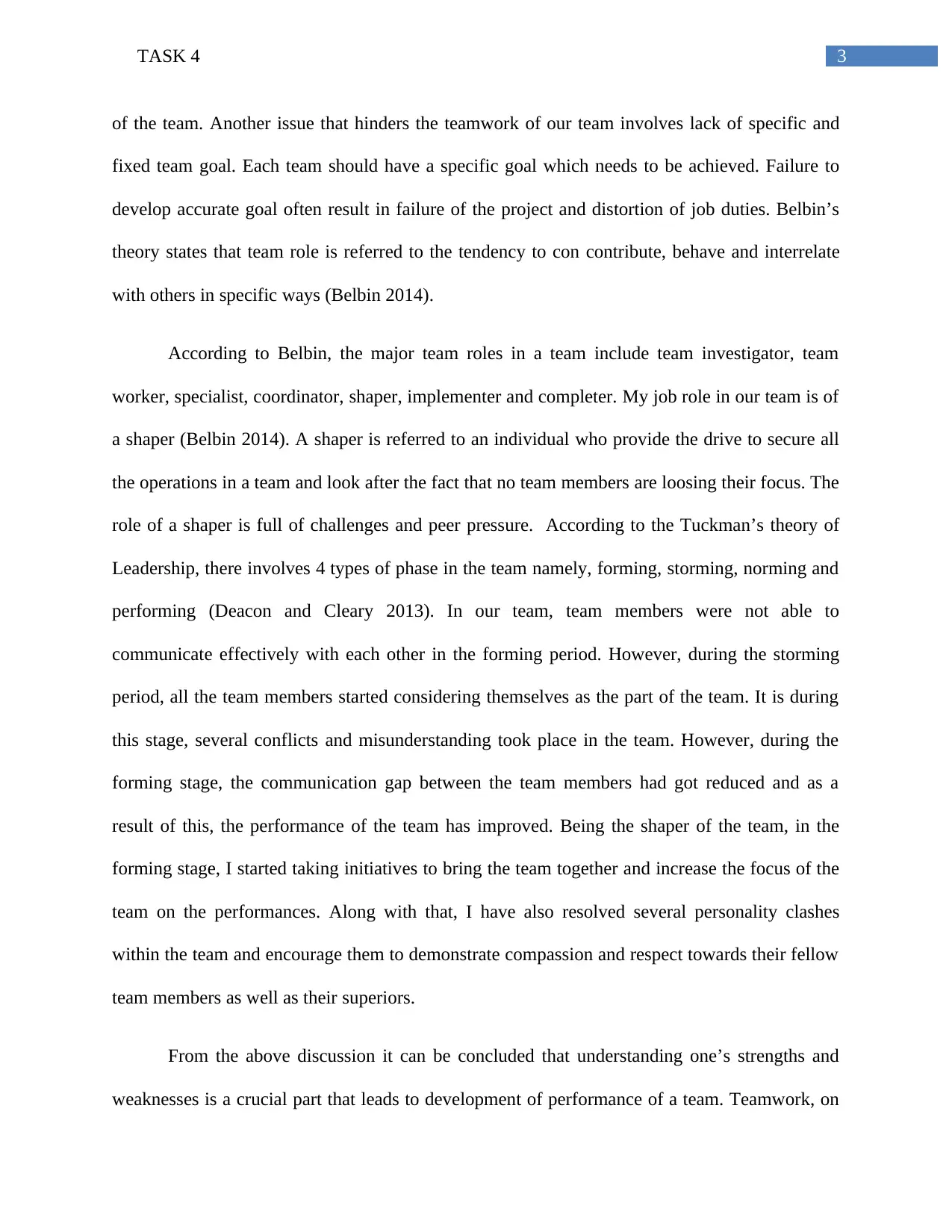
3TASK 4
of the team. Another issue that hinders the teamwork of our team involves lack of specific and
fixed team goal. Each team should have a specific goal which needs to be achieved. Failure to
develop accurate goal often result in failure of the project and distortion of job duties. Belbin’s
theory states that team role is referred to the tendency to con contribute, behave and interrelate
with others in specific ways (Belbin 2014).
According to Belbin, the major team roles in a team include team investigator, team
worker, specialist, coordinator, shaper, implementer and completer. My job role in our team is of
a shaper (Belbin 2014). A shaper is referred to an individual who provide the drive to secure all
the operations in a team and look after the fact that no team members are loosing their focus. The
role of a shaper is full of challenges and peer pressure. According to the Tuckman’s theory of
Leadership, there involves 4 types of phase in the team namely, forming, storming, norming and
performing (Deacon and Cleary 2013). In our team, team members were not able to
communicate effectively with each other in the forming period. However, during the storming
period, all the team members started considering themselves as the part of the team. It is during
this stage, several conflicts and misunderstanding took place in the team. However, during the
forming stage, the communication gap between the team members had got reduced and as a
result of this, the performance of the team has improved. Being the shaper of the team, in the
forming stage, I started taking initiatives to bring the team together and increase the focus of the
team on the performances. Along with that, I have also resolved several personality clashes
within the team and encourage them to demonstrate compassion and respect towards their fellow
team members as well as their superiors.
From the above discussion it can be concluded that understanding one’s strengths and
weaknesses is a crucial part that leads to development of performance of a team. Teamwork, on
of the team. Another issue that hinders the teamwork of our team involves lack of specific and
fixed team goal. Each team should have a specific goal which needs to be achieved. Failure to
develop accurate goal often result in failure of the project and distortion of job duties. Belbin’s
theory states that team role is referred to the tendency to con contribute, behave and interrelate
with others in specific ways (Belbin 2014).
According to Belbin, the major team roles in a team include team investigator, team
worker, specialist, coordinator, shaper, implementer and completer. My job role in our team is of
a shaper (Belbin 2014). A shaper is referred to an individual who provide the drive to secure all
the operations in a team and look after the fact that no team members are loosing their focus. The
role of a shaper is full of challenges and peer pressure. According to the Tuckman’s theory of
Leadership, there involves 4 types of phase in the team namely, forming, storming, norming and
performing (Deacon and Cleary 2013). In our team, team members were not able to
communicate effectively with each other in the forming period. However, during the storming
period, all the team members started considering themselves as the part of the team. It is during
this stage, several conflicts and misunderstanding took place in the team. However, during the
forming stage, the communication gap between the team members had got reduced and as a
result of this, the performance of the team has improved. Being the shaper of the team, in the
forming stage, I started taking initiatives to bring the team together and increase the focus of the
team on the performances. Along with that, I have also resolved several personality clashes
within the team and encourage them to demonstrate compassion and respect towards their fellow
team members as well as their superiors.
From the above discussion it can be concluded that understanding one’s strengths and
weaknesses is a crucial part that leads to development of performance of a team. Teamwork, on
Paraphrase This Document
Need a fresh take? Get an instant paraphrase of this document with our AI Paraphraser
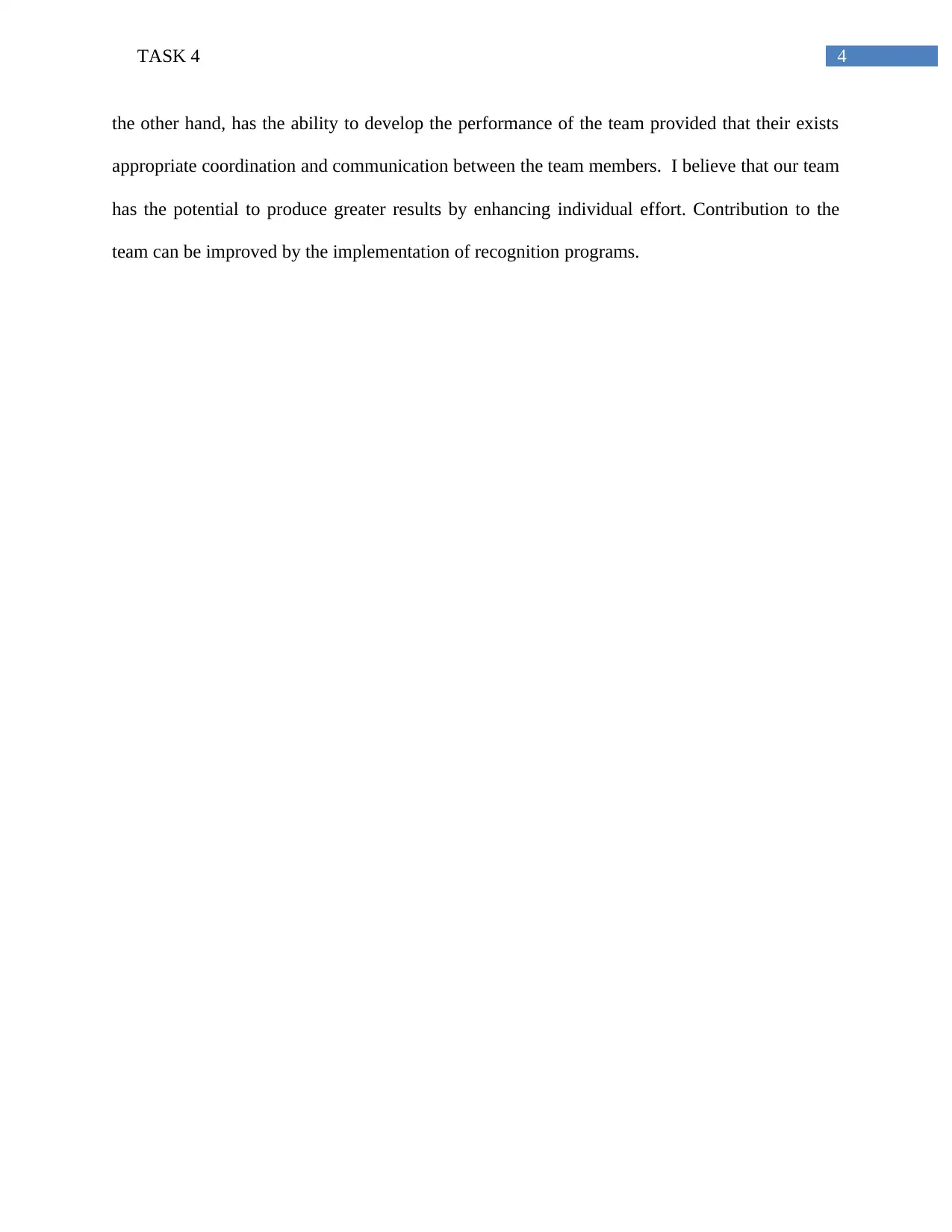
4TASK 4
the other hand, has the ability to develop the performance of the team provided that their exists
appropriate coordination and communication between the team members. I believe that our team
has the potential to produce greater results by enhancing individual effort. Contribution to the
team can be improved by the implementation of recognition programs.
the other hand, has the ability to develop the performance of the team provided that their exists
appropriate coordination and communication between the team members. I believe that our team
has the potential to produce greater results by enhancing individual effort. Contribution to the
team can be improved by the implementation of recognition programs.
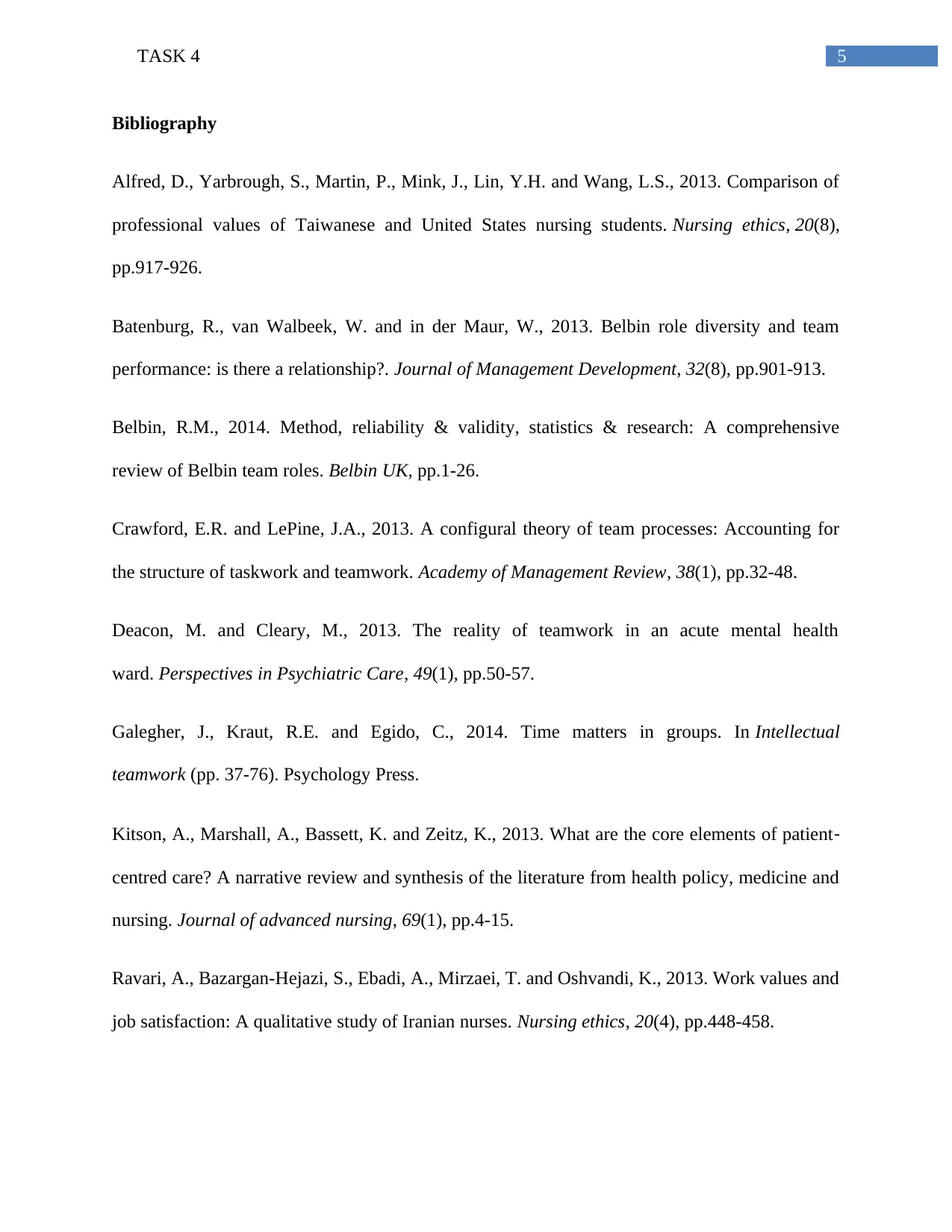
5TASK 4
Bibliography
Alfred, D., Yarbrough, S., Martin, P., Mink, J., Lin, Y.H. and Wang, L.S., 2013. Comparison of
professional values of Taiwanese and United States nursing students. Nursing ethics, 20(8),
pp.917-926.
Batenburg, R., van Walbeek, W. and in der Maur, W., 2013. Belbin role diversity and team
performance: is there a relationship?. Journal of Management Development, 32(8), pp.901-913.
Belbin, R.M., 2014. Method, reliability & validity, statistics & research: A comprehensive
review of Belbin team roles. Belbin UK, pp.1-26.
Crawford, E.R. and LePine, J.A., 2013. A configural theory of team processes: Accounting for
the structure of taskwork and teamwork. Academy of Management Review, 38(1), pp.32-48.
Deacon, M. and Cleary, M., 2013. The reality of teamwork in an acute mental health
ward. Perspectives in Psychiatric Care, 49(1), pp.50-57.
Galegher, J., Kraut, R.E. and Egido, C., 2014. Time matters in groups. In Intellectual
teamwork (pp. 37-76). Psychology Press.
Kitson, A., Marshall, A., Bassett, K. and Zeitz, K., 2013. What are the core elements of patient‐
centred care? A narrative review and synthesis of the literature from health policy, medicine and
nursing. Journal of advanced nursing, 69(1), pp.4-15.
Ravari, A., Bazargan-Hejazi, S., Ebadi, A., Mirzaei, T. and Oshvandi, K., 2013. Work values and
job satisfaction: A qualitative study of Iranian nurses. Nursing ethics, 20(4), pp.448-458.
Bibliography
Alfred, D., Yarbrough, S., Martin, P., Mink, J., Lin, Y.H. and Wang, L.S., 2013. Comparison of
professional values of Taiwanese and United States nursing students. Nursing ethics, 20(8),
pp.917-926.
Batenburg, R., van Walbeek, W. and in der Maur, W., 2013. Belbin role diversity and team
performance: is there a relationship?. Journal of Management Development, 32(8), pp.901-913.
Belbin, R.M., 2014. Method, reliability & validity, statistics & research: A comprehensive
review of Belbin team roles. Belbin UK, pp.1-26.
Crawford, E.R. and LePine, J.A., 2013. A configural theory of team processes: Accounting for
the structure of taskwork and teamwork. Academy of Management Review, 38(1), pp.32-48.
Deacon, M. and Cleary, M., 2013. The reality of teamwork in an acute mental health
ward. Perspectives in Psychiatric Care, 49(1), pp.50-57.
Galegher, J., Kraut, R.E. and Egido, C., 2014. Time matters in groups. In Intellectual
teamwork (pp. 37-76). Psychology Press.
Kitson, A., Marshall, A., Bassett, K. and Zeitz, K., 2013. What are the core elements of patient‐
centred care? A narrative review and synthesis of the literature from health policy, medicine and
nursing. Journal of advanced nursing, 69(1), pp.4-15.
Ravari, A., Bazargan-Hejazi, S., Ebadi, A., Mirzaei, T. and Oshvandi, K., 2013. Work values and
job satisfaction: A qualitative study of Iranian nurses. Nursing ethics, 20(4), pp.448-458.
⊘ This is a preview!⊘
Do you want full access?
Subscribe today to unlock all pages.

Trusted by 1+ million students worldwide
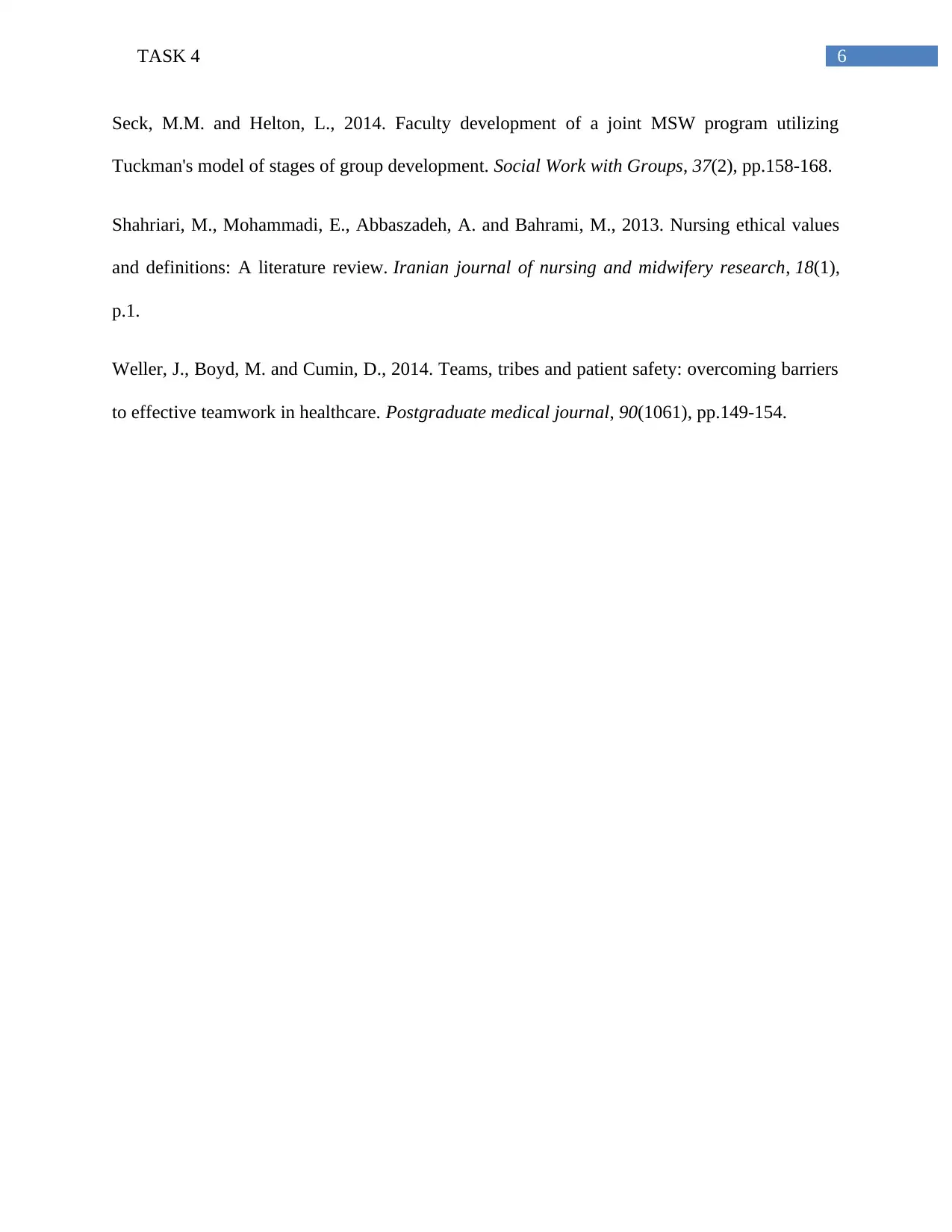
6TASK 4
Seck, M.M. and Helton, L., 2014. Faculty development of a joint MSW program utilizing
Tuckman's model of stages of group development. Social Work with Groups, 37(2), pp.158-168.
Shahriari, M., Mohammadi, E., Abbaszadeh, A. and Bahrami, M., 2013. Nursing ethical values
and definitions: A literature review. Iranian journal of nursing and midwifery research, 18(1),
p.1.
Weller, J., Boyd, M. and Cumin, D., 2014. Teams, tribes and patient safety: overcoming barriers
to effective teamwork in healthcare. Postgraduate medical journal, 90(1061), pp.149-154.
Seck, M.M. and Helton, L., 2014. Faculty development of a joint MSW program utilizing
Tuckman's model of stages of group development. Social Work with Groups, 37(2), pp.158-168.
Shahriari, M., Mohammadi, E., Abbaszadeh, A. and Bahrami, M., 2013. Nursing ethical values
and definitions: A literature review. Iranian journal of nursing and midwifery research, 18(1),
p.1.
Weller, J., Boyd, M. and Cumin, D., 2014. Teams, tribes and patient safety: overcoming barriers
to effective teamwork in healthcare. Postgraduate medical journal, 90(1061), pp.149-154.
1 out of 7
Related Documents
Your All-in-One AI-Powered Toolkit for Academic Success.
+13062052269
info@desklib.com
Available 24*7 on WhatsApp / Email
![[object Object]](/_next/static/media/star-bottom.7253800d.svg)
Unlock your academic potential
Copyright © 2020–2026 A2Z Services. All Rights Reserved. Developed and managed by ZUCOL.





